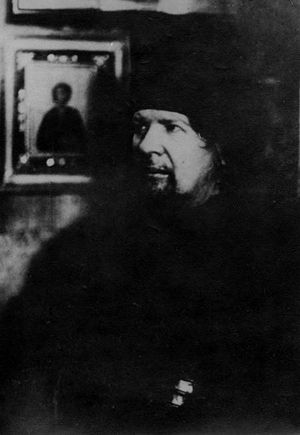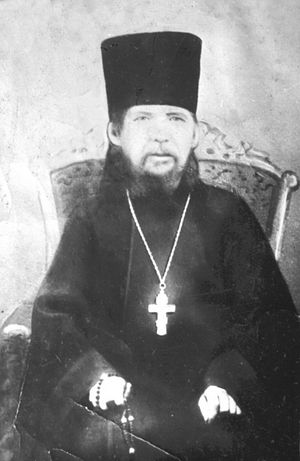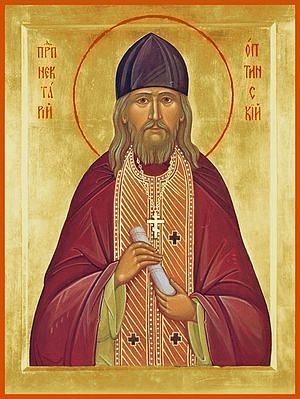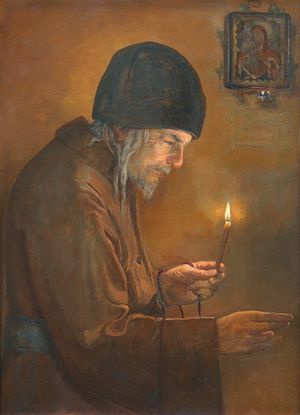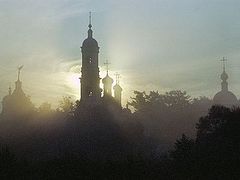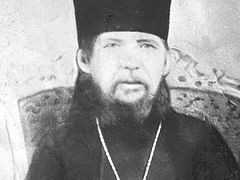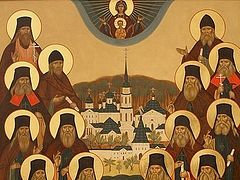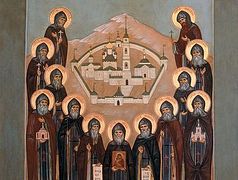The last of the famous elders of Optina, Nectarius, was born in the town of Yeltz of poor parents, Basil and Helena Tikhonov, in 1857 or 1858. He was baptized in the Yeltz church of St. Sergius and given the name Nicholas. His godparents were called Nicholas and Matrona. He always prayed for them and for his parents. His father worked in a mill and died when the boy was only seven. He was bright and loved to learn, but being poor was only able to attend the village school.
Once he was playing near his mother. Nearby was a cat whose eyes were shining brightly. The boy grabbed a needle and thought of stabbing the animal's eye to see what was making it shine, but his mother hit his hand:
"Naughty boy! If you dare to poke out the cat's eye, you yourself will later be without an eye!"
Many years later when already a monk, the elder remembered this incident. He came to the skete's well where there hung a ladle with a pointed ladle. Another monk, not noticing the elder, lifted the ladle in such a way that the pointed end came within inches of the elder's eye, and just in the nick of time the elder was able to push it aside.
"If I had poked out the cat's eye at that time, I would now be without an eye," he said. "Obviously, all this had to be to remind me, the unworthy one, that everything in life, from the cradle to the grave, is taken into serious account by God."
Nicholas was very close to his mother, who brought him up strictly but with love. She, too, died early, leaving him a complete orphan. When he was eleven she arranged for him to work in the shop of the merchant Khamov, and there until he was seventeen he worked up to the position of youngest steward. He grew up to be quiet, prayerful and lover of reading. He had a very handsome face with a rosy complexion and curly blond hair like a girl's - so said the oldest Optina monks who remembered him in his youth.
As soon as he turned eighteen, the oldest of Khamov's students thought of marrying off his daughter to him; and his employer supported this idea. The girl was very nice and Nicholas was drawn to her. Even ten years later, remembering his bride-to-be, he would smile; and to one nun whom he used to receive very kindly, he said:
"You remind me of my bride of long ago."
At that time there lived in Yeltz a righteous old woman already nearly 100 years old - Schema-Nun Theoctista, a spiritual daughter of St. Tikhon of Zadonsk. The Yeltz inhabitants would go to her for advice. And the merchant counselled Nicholas to go to her for a blessing on his marriage. But when he came, the schema-nun said to him:
"Young man, go to Optina to Fr. Hilarion and he will tell you what to do."
She made the sign of the cross over him and gave him tea for the road. He kissed her hand and went to his employer.
"Matushka Theoctista is sending me to Optina."
The merchant said nothing and even gave him money for the journey. Nicholas said goodbye to his bride and left; they never saw one another again.
So in 1876 Nicholas arrived at Optina, carrying only a Gospel in his knapsack. The skete superior, Fr. Hilarion, sent him to Elder Ambrose, who saw Nicholas straight away and spoke to him for two hours. Elder Nectarius never revealed the content of this conversation, but afterwards he remained in the skete and never returned home even for a day.
Once he saw that a pilgrim had the book, The Life of Elder Hilarion, and he remarked:
"I am indebted to him for everything. He received me into the skete fifty years ago when I came not having a place to lay my head - a total orphan, penniless, and the whole brotherhood at that time was very educated. And so I was the very least among them."
His spiritual father was Elder Anatolius (Zertsalov), but he also went for advice to Elder Ambrose. These holy elders led Nectarius along the strict path of true monasticism.
His first obedience was to look after the flowers, which he loved. Then he was appointed sacristan. Nicholas had a cell which opened into the church. In this cell he lived for 25 years without speaking to any of the monks; he went only to Elder Anatolius or Elder Ambrose. In this obedience he was often late for church and walked with swollen, sleepy eyes. The brothers complained about him to Fr. Ambrose, but he replied:
"Wait, Nikolka will sleep it off and come in useful to everyone."
He attached great significance to obedience.
"The highest and first virtue is obedience. Christ came into the world for the sake of obedience, and the life of man on earth is obedience to God. But obedience must be understood; it must be properly valued, otherwise it can be destructive. Without obedience a man is impulsive and as if in a fever, but then comes a weakening, a cooling and stiffening, and the man cannot go on. Obedience is difficult at first - always semi-colons. But then all punctuation marks are smoothed away."
When citing some text or example from Holy Scripture, he would usually talk both about the direct, literal meaning, and about the allegorical meaning. For example: "Blessed is that man that hath not walked in the counsel of the ungodly." From the external point of view, this means that blessed is the man who avoids ungodly meetings, taking no part in heretical or antiecclesiastical teachings. But the man also stands for the mind when it does not accept thoughts coming from the enemy. It is impossible to stop thoughts from coming, but it is possible not to enter into meetings or conversations with them, and instead say: "Lord, have mercy!" So the man is he who acts in this way.
Fr. Nectarius received the mantia in 1887. In 1894 he was ordained to the diaconate, and in 1898 Bishop Macarius of Kaluga made him a hieromonk. Now he almost never left his cell, and for eleven years he even covered the windows of his cell with blue paper. He used to say that for a monk there are only two exits from his cell - into the church and into the grave. But in these years he studied and read. He read not only the Holy Fathers and spiritual works, but also studied science, mathematics, history, geography and classical literature both Russian and foreign. He spoke to his visitors about Pushkin and Shakespeare, Milton and Krylov, Spingler and Rider Haggard, Blok, Dante, Tolstoy and Dostoyevsky. In his only hour of rest after dinner he asked to be read aloud Pushkin or some fairy-tales - either Russian or the Brothers Grimm. He studied Latin and French. He was close to Constantine Leontiev, who used to read to him his works in manuscript. He learned painting from the artist Bolotov, who became a monk and founded an icon-painting studio in Optina.
The elder said about art and literature: "One can practise art like anything else, but everything must be done as under God's gaze. There is great art and there is lesser art. One can define the lesser as follows: there exist sounds and lights. An artist is someone who is sensitive to these sounds and lights which others are unable to perceive. He takes them and puts them on canvas, on paper. They become colours, notes, words. It is as though the sounds and lights have dissolved. From light there remains colour. A book, a painting - these are the sarcophagi of light and sound. a reader or a beholder comes and, if he is able to creatively apprehend or read, a 'resurrection' of meaning takes place. And then the circle of art is completed. Light flashes in the soul of the beholder or reader, his hearing becomes awakened to sound. For this reason an artist or poet has no particular cause for pride. He is only doing his share of the work. In vain do they suppose themselves to be the creators of their works - there is one Creator, and men only dissolve the words and images of the Creator and then revive them by the power of the spirit given by Him.
"But there is also greater art - the word of life and death (the Psalms of David, for example), but the way to this art lies in the personal struggle of the artist. This is the path of sacrifice, and only one out of many thousands reach the goal.
"All the poetic verses in the world are not worth a line of Holy Scripture. Pushkin was the cleverest man in Russia, but he couldn't manage to live his own life!"
And he emphasized the need for writers to consider every word:
"Before beginning to write, dip the pen seven times into the ink well."
He once refused a blessing to a girl who was dreaming of going on stage. When asked why he replied:
"She will not overcome and will be corrupted. Here strength is necessary. Modesty in our day is a great virtue. This is nothing less than chastity. And to preserve chastity (and among you intelligentsia this is easiest to lose) is to preserve all."
Once one of his spiritual daughters was sorrowfully talking to her friend in his reception room:
"I don't know, perhaps education is altogether unnecessary and only brings harm. How can it be reconciled with Orthodoxy?"
The elder, coming out of his cell, rejoined: "Once a man came to me who simply couldn't believe that there had been a flood. Then I told him that on very high mountains in the sand are found shells and other remains from the ocean floor, and how geology testifies to the flood, and he came to believe. You see how necessary learning is at times."
And again he said: God not only permits, but demands of man that he grow in knowledge. However, it is necessary to live and learn so that not only does knowledge not ruing morality, but that morality not ruin knowledge."
About history he once said:
"It shows us how God rules the peoples and gives as it were moral lessons to the universe."
Speaking about mathematics, he loved to ask: can a triangle be equal to a circle? and often cited the patristic example:
"God is the centre of the circle, and people - the radii. As they come closer to the centre they come closer to each other."
At another time he said: "One prophet had a vision of God - not in a circle of light but in a triangle. This was a sign that man cannot approach and experience the impenetrable depth of the mystery of God. To man is given only to experience that which surrounds the Divinity; but if he makes bold to penetrate beyond these limits, he will perish from the sharp corners of the triangle."
On inner work he used to say: "The outer belongs to you, but the inner to the grace of God. So practise the outer and, when everything is in good order, the inner will be formed. One should not expect or seek miracles. We have one miracle: the Divine Liturgy. This is the greatest miracle, one should try to measure up to it."
During these years of study and spiritual growth, the elder began to take upon himself foolishness for Christ. He wore brightly coloured sweaters over his cassock; all his food he dumped together into one pot - the sour, the sweet and the salty. He walked about the skete with a boot on one foot and a slipper on the other. He bewildered the monks even more, even as an elder, with all his toys. He had toy automobiles, boats, trains and later even airplanes. He had music boxes and wound up a gramophone with religious records, but the skete administration put a stop to it.
In 1913 the Optina monks gathered to elect a new elder. At first they offered the eldership to Archimandrite Agapit, who was living in Optina in retirement, a widely educated and deeply spiritual man. But he refused. He was leading a soul-saving life surrounded by only a few of his close disciples, one of whom was Hieromonk Nectarius. When the brethren asked him to indicate a worthy candidate, he nominated Fr. Nectarius. The latter in his humility was not even present at the meeting. When he had been chosen, Fr. Abercius was sent to get him. Coming to him he said:
"Batiushka, your presence is requested at the meeting."
But Fr. Nectarius declined, saying:
"They can choose whomever is needed without me."
"The archimandrite sent me to get you and asks that you come!" said Fr. Abercius.
Then Batiushka immediately put on his riassa, and just as he was - one foot in a shoe, the other in a slipper - he went to the meeting.
"Batiushka," they greeted him, "you have been chosen as the spiritual father and elder of the brotherhood."
"No, fathers and brothers! I am stupid and cannot carry such a burden," said Batiushka, declining.
But the archimandrite said to him: "Fr. Nectarius, accept this obedience."
And then Batiushka agreed. He used to say:
"What kind of an elder am I? How can I be the heir of the earlier elders? I'm weak and feeble. Grace came to them in big loaves, but to me in little slices..."
"The story of Job," said the elder, "is a lesson for all men. When a man is rich, learned and happy, God does not answer. When a man is on a dung hill, abandoned by everyone, then God appears and Himself speaks to him. But the man only listens and cries out: 'Lord, have mercy!' Only the measure of abasement varies."
"The main thing is to guard oneself from judging one's neighbour. As soon as such a thought enters the mind, immediately and with attention turn to the Lord: 'Lord, make me to see my own faults and not to judge my brother.'"
The elder was clairvoyant and prophesied. He also worked miracles. Thus Fr. Basil Shustin wrote: "Batiushka told me:
"'Rinse out the samovar first, then pour in water. The water's standing there, in the corner, in the copper jug. Take it and pour in the water.'
"I went up to the jug, but it was very big, containing twenty-four litres, and massively built. I tried to move it, but no - I didn't have the strength. But batiushka told me:
"'Take the jug and pour the water into the samovar.'
"'But you know, batiushka, it's too heavy, I can't move it from its place.'
"Then batiushka went up to the jug, made the sign of the cross over it, and said:
"'Take it.'
"Then I lifted it, and it seemed very light to me."
In 1917 the elder prophesied: "A hard time is coming. The number six has passed in the world, and the number seven has begun. Now begins the age of silence. Be silent, silent," said batiushka, and tears flowed from his eyes. "And now his Majesty is not his own man, he is suffering such humiliation for his mistakes. 1918 will be still worse. His Majesty and all his family will be killed, tortured. And our tsar will stand before the throne of God wearing the crown of a great-martyr. Yes, this tsar will be a great-martyr.
"In the last days," he said, "the world will be encircled by paper and iron. Noah's time is a figure of our own. The flood was approaching. Noah knew about it and told the people, but they did not believe him. He hired workers to build the ark, and they, while building the ark, did not believe, and so they only received the agreed pay for their work, but were not saved. Those days are a prefiguring of ours. The ark is the Church, only those who are in it will be saved."
"We must pray. By prayer and the word of God every filth is cleansed. The soul cannot be reconciled with life and is consoled only through prayer. Without prayer the soul is dead to grace."
"Forcing oneself is necessary in everything. Suppose a dinner is served, and you want to eat and smell the delicious smell, nevertheless the spoon will not bring the food to you of itself. You have to force yourself, get up, go up and take the spoon and then eat. And no work is accomplished immediately - waiting and patience are required everywhere."
Concerning prayer, the elder said to one of his spiritual sons: "I will light your lamp, but you must take care of the wick yourself."
And about the Six Psalms: "The Six Psalms must not be read like kathismas, but like prayers. The meaning of the Six Psalms is very deep; it is the prayer of the Son to God the Father."
The elder said to one of his spiritual daughters, the secret nun Lydia: "Soon there will be a famine of books. Buy books, otherwise you will not be able to buy them for any money."
They asked the saint how to pray for those about whom it is not known whether they are alive. "You will not be erring if you pray for them as for the living, because everyone is alive with God. Everyone except heretics and apostates. They are dead. So, if you like, commemorate them as dead people."
"This is an order for you: when you prepare for holy Communion, less wordiness and more prayerfulness."
One woman said to the elder: "Batyushka, I'm very annoyed."
And he replied: "When irritation comes upon you, only repeat: 'Lord, have mercy!' Seek strength in prayer and consolation in work."
The old carter Timothy fell on his knees before batyushka. Timothy's face was all transfigured by faith, tender feeling and hope. "Batyushka, give me your elder's instruction, so that your warm ray my heat up my cold soul, so that it may flare up to the path on high." After this fine phrase he said simply: "Batyushka, I have no tears."
But the elder leaned towards him with a wonderful smile and said: "It doesn't matter, your soul weeps, and such tears are much more valuable than bodily ones."
The elder was strict, demanding and sometimes ironic with the intelligentsia, but exceptionally kind and approachable with simple people. In confession he was very strict, pointing to the significance of thoughts as well as deeds. But sometimes he was kind and even joked.
One woman who had not done confession since her youth and was far from the Church, accompanied her sick husband to the elder. He made a strong impression on her, and when he suggested that she do confession, she agreed. She entered, and he led her to the icons:
"Stand here and pray!"
Having placed her there, he himself went into his cell. She stood and looked at the icons. She didn't like them - they were not artistic and even the lampada seemed mediocre to her. It was quiet in the room. Only the saint was walking behind the wall and rustling something. And suddenly she began to feel sadness and compunction, and involuntarily and imperceptibly she began to weep. Tears dimmed her eyes, and she could no longer see the icons and lampada but only an iridescent cloud behind which there seemed to be the presence of God. When the saint entered, she was standing all in tears.
"Read 'Our Father'."
Somehow, stumblingly, she read it.
"Read the 'Symbol of Faith'."
"I don't remember it."
The elder himself began to read it, and after each article he asked:
"Do you believe this?"
To the first two she replied: "I believe."
When they reached the third article, she said that she understood nothing there and felt nothing for the Mother of God. Batyushka reproached her and ordered her to pray for enlightenment to the Heavenly Queen, so that she herself should teach her how to understand the Symbol of Faith. And with regard to the majority of the other articles of the Symbol of Faith the woman said that she did not understand them and had never thought about them. But she wept bitterly, and all the time felt that it was impossible to hide anything and it would be pointless to try and hide anything, and that this was for her like a prefiguring of the Terrible Judgement, while the saint asked her about her personal sins as if she were a child, so that she began to reply to him with a smile through her tears. Then he absolved her from her sins since childhood to the present day.
Once a spiritual daughter of his asked the elder: did he have to take upon himself all the sufferings and sins of those who came to him for relief and consolation? He replied:
"You yourself have understood, so I shall tell you - it is impossible to relieve them in any other way. And you sometimes feel as if literally a mountain of stones had fallen on you, so many sins and pain did they bring you, and you cannot bear it. Then grace comes to your weakness and clears away this mountain of stones as if it were a mountain of dry leaves..."
The clairvoyant elder often gave messages in an indirect way, through parables. Thus Bishop Theophanes of Kaluga did not believe in the holiness of the elder. When he visited Optina and went to him, the elder paid no attention to him and occupied himself with his dolls (they had been given to him by some children out of love for him). He ordered one to be put in prison, giving it a sentence; another he beat, and a third he punished. Bishop Theophanes decided that he was mad. But when Vladyka was taken by the Bolsheviks and put in prison, he understood everything and said:
"I am a sinner before God and the elder. Everything he said was about me, and I thought that he was mad."
During his exile Vladyka suffered much from his landlord, but did not complain. However, he later fell into the schism created by Metropolitan Sergius.
Elder Nectarius also said: "Russia will arise and will be materially poor, but in spirit she will be wealthy, and in Optina there will be seven more lights, seven pillars."
And he said: "You know that if you translate the apocalyptic number 666, you get free thinker."
When the heresy of renovationism arose, the elder took a firm stand against it. He said: "I fear the red hierarchs", and: "There is no grace there. Rebelling against the lawful patriarch Tikhon, the bishops and priests of the 'Living Church' deprived themselves of grace and lost, according to canonical ruling, their hierarchical office. Because of this the Liturgy performed by them is a mockery."
The elder forbade his spiritual children from entering the churches taken over by the renovationists. If there were wonderworking icons in such churches, the Iveron Mother of God, for example, he would instruct them on entering the church to go straight to the icon and neither by thought nor movement to participate in the service. Candles placed before the icon were to be brought from home or from an Orthodox church.
In 1923, just before Pascha, Optina was officially closed by the Bolsheviks. The churches were sealed, the graves of the elders desecrated and the skete turned into a resort for the Soviet upper class. Fr. Nectarius was arrested and put in a prison hospital in Kozelsk.
After his departure from Optina, the Bolsheviks put an occultist into his cell in order to discover, as they thought, the treasures that were hidden there. (It is well known that they made frequent use of occult powers to pursue their ends.) It was night, and a kerosene lamp burned in the cell. The magician-occultist began his spells and, although the lamp continued to burn, the room became dark. At this point a nun who was there took Fr. Nectarius' prayer-rope and made the sign of the cross with it. Immediately it became light, but the magician writhed on the ground in convulsions.
As the elder himself said of spiritists: "Finally, when the unfortunate soul with Satan's help has reached the last step in leading himself astray, he either takes leave of his senses - the man becomes literally irresponsible - or he commits suicide."
On leaving prison, Fr. Nectarius settled in the house of a peasant in the village of Kholmischchi in Bryansk region. Here, although many of his spiritual children visited him, life was very difficult for him. The authorities threatened him with exile to Kamchatka.
Elder Nectarius also worked miracles of healing. Eugenia Grigorievna Rymarenko, the wife of Fr. Adrian, later Archbishop Andrew of Rockland, recalls: "I remember during Lent the unusual case of Fr. Adrian's healing by Batiushka's prayers. Every evening I sent medicine (powders, mineral water) - from the beginning of Lent he had unbearable abdominal pains. Fearfully, the people were talking among themselves that he would probably be so sick that he wouldn't even be able to carry out the Cross. He didn't want to eat non-lenten food, and I didn't know what to do with him! I wrote to a certain nun in Kozelsk, Anastasia, so that she would ask Batiushka to pray. And then (for, when Fr. Adrian went in the morning to liturgy on the day of the bringing out of the Cross, he still had pains), toward evening everything went away, and the evening church service, with the bringing out of the Cross, passed without his having pains. The pains stopped for a long period of time and didn't return. Mother Anastasia told me that Batiushka had arranged a short moleben and everyone heard how he prayed for 'the sick priest Fr. Adrian'."
In 1927 Fr. Nectarius foretold to Professor I.M. Andreyev that very heavy trials and sufferings lay ahead for him, but that in the end everything would turn out well and he would be free and have the opportunity of working actively for the Orthodox Church.
In February, 1929, the professor was arrested for being a member of the Catacomb Church, was exiled to the Solovki labour camps, and then was in exile. But everything turned out well and after the war of 1941-45 he emigrated to America, where he became a professor in the Jordanville theological seminary.
Once a young girl came to ask the elder's blessing to become a nun. But he said:
"No, you will have a bridegroom, you will marry, you will bear a child and he will weigh ten pounds."
It turned out exactly as he said. And two years later the girl brought her son to the elder to be blessed.
One of Fr. Nectarius' constant visitors relates the following: "Patriarch Tikhon did not visit Fr. Nectarius, and Fr. Nectarius did not visit the patriarch. It seems that there was no correspondence between them. However, it seems that many questions were decided by the patriarch in accordance with the elder's opinion. People close to both men would convey the elder's opinion to the patriarch. And he always acted in accordance with his advice."
Or almost always. We know of one case in which the elder criticized a decision of the patriarch's - his decision in 1922 to allow the church valuables - with the exception of the most sacred vessels used in the celebration of the Divine Liturgy - to be given to the Bolsheviks, supposedly so that they should be sold and the proceeds given to the starving in the Volga region. "You see now," said the elder to Matushka Evegnia Rymarenko, "the patriarch gave the order to give up all valuables from the churches, but they belonged to the Church! Only don't say anything about this to Fr. Adrian, please, don't say anything..."
Of course, as I.M. Kontzevich writes, "the position of the patriarch was exceptionally difficult. The authorities were trying to destroy the foundations of Christianity. At this time Optina, under the direction of the elders in general and the last elder, Batiushka Nectarius, in particular, went firmly ahead without deviating to either side. Through the authority of the elder Optina spread its influence into every corner of Russia; for people devoted to the Church poured to it from all sides in spite of the difficulties and dangers. Bishops, priests and laymen addressed the elder both personally and in writing and orally, through other people. They sought the resolution of spiritual, ecclesiastical and everyday questions. The elder's opinion on this or that question was absolutely authoritative and quickly spread among the truly believing people, who were a support for the patriarch in all his initiatives.
"A quite different situation arose with the coming to power of Metropolitan Sergius: between the latter and Fr. Nectarius there was no communication.
"Even before the declaration of Metropolitan Sergius, in the same summer of 1927, Professors Komarovich and Anichkov were visiting the elder. During the conversation the elder called Metropolitan Sergius a renovator. When they objected that Sergius had repented, the elder replied:
"'Yes, he has repented, but the poison is in him still.'"
And according to Archbishop Lazarus of Tambov, the elder said: "Sergianism is worse than renovationism... It is worse because the renovationists repented, but these will not repent, they will become hardened of heart."
Elder Nectarius sent some of his spiritual children to the churches of those who had separated from Metropolitan Sergius, both in Moscow and in Petrograd. And when he was dying, he said that his body should not be sent to Kozelsk for the burial service, since the brothers in Kozelsk recognized Metropolitan Sergius.
"Kozelsk has set off on a false path," he said.
They say that at the time of his arrest, when the authorities demanded that batyushka refuse to receive visitors, all the Optina elders appeared to him and said:
"If you want to be with us, do not refuse your spiritual children."
And he did not refuse.
The Optina elders appeared to him for the second time when they wanted to take him away from Kholmishchi. At that time they forbade him to leave.
Elder Nectarius died on April 29 / May 12, 1928 in Kholmishchi. The last rites were given to him by Fr. Adrian Rymarenko, later Archbishop Andrew of Novo-Diveyevo. At the moment of death Fr. Adrian placed his stole over the dying elder. He reposed quietly. He was buried in the local cemetery on May 3/16 by five priests led by Fr. Sergius Mechiev, the future hieromartyr. It was a bright spring day, and a great joy was felt in the hearts of his weeping spiritual children.
The elder foreknew his death and bade farewell to his close ones already two months before he died. He blessed them for the last time, gave them some parting counsels and gave them over into the care of this or that spiritual father. After his death he appeared in dreams to his spiritual children.
In 1935 some village hooligans dug up his grave one night. They tore the lid off the coffin and the covering from the face of the dead man, and then leaned the open coffin against a tree. In the morning, as little children were leading horses from their nightly grazing spot, they saw the coffin and galloped to the village, shouting:
"A monk arose from the grave!"
The collective farm worker ran to the cemetery and said: "The elder was standing incorrupt - his skin was wax-coloured and his arms and hands were soft."
One woman brought a white silk covering and with it they covered the face of the elder. Then they closed the coffin and lowered it into the grave, singing "Holy God".
The elder prophesied that his relics would not remain in Kholmishchi, and on July 16, 1989, they were returned to Optina and placed in the cathedral of the Entry of the Mother of God into the Temple.
Arsenius Malyutin writes: "For a long time the honourable remains of the blessed one remained in oblivion. And only on July 16, 1989, the day of the commemoration of Metropolitan Philip of Moscow, were the relics of Elder Nectarius transferred to Optina Hermitage. The brethren of the community arrived at the elder's grave at about 6 o'clock in the morning, and in about one-and-a-half hours, at a depth of two metres, they found the coffin in which the relics of the saints were resting. When they opened it, everyone senses a fragrance; the mantia of the elder was incorrupt, and his relics of an amber colour..."
(Sources: Zhitiya Prepodobnykh Startsev Optinoj Pustyni, Jordanville, 1992; The Orthodox Word, July-August, 1971, July-August, 1986; Archbishop Lazarus, "Out of the Catacombs", Orthodox America, June, 1990; Eugenia Grigorievna Rimarenko, "Remembrances of Optina Staretz Hieroschemamonk Nektary", Orthodox Life, vol. 36, no. 2, March-April, 1986, pp. 38, 44; Orthodox Life, vol. 36, no. 3, May-June, 1986; Pravoslavnaya Zhizn', vol. 41, no. 6 (485), June, 1990; I.M. Kontzevich, Optina Pustyn' i yeyo Vremya, Jordanville: Holy Trinity Monastery, 1970; Living Orthodoxy, vol. XIV, no. 3, May-June, 1992, pp. 27-29; Arsenius Malyutin, "Starets Nektarij Optinskij, Novij Ispovednik", Svyataya Rus', N 2, 1993, pp. 59-67; Tsvetochki Optinoj Pustyni, Moscow: Palomnik, 1995; "K.P.", letter to Russkij Pastyr', 30, I-1998, p. 102)

